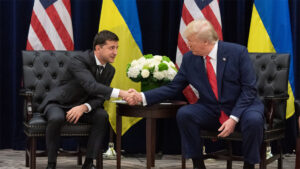This isn’t a brag piece.
Many have credited me with predicting the Trump rise. To be clear, I never predicted Trump’s entry into politics, or that he’d win the Republican party nomination or that he’d carry the presidency.
But this is still a bit of an “I told you so.”
Everything about the American position in the international system is based upon the Americans holding together what we currently call the international order. Americans have been doing this since 1944. At that point the Americans re-forged the global system, shifting it from a series of warring imperial networks into a global system they personally managed. The Americans imposed global order — the first global order — and created free trade as a means of purchasing the loyalty of the Western and Asian allies, the defeated Axis powers, and in time Communist China. It was all about paying for alliance networks to contain and defeat the Soviet Union. When the Cold War ended the Americans neglected to shift their policies. The Americans continued to provide global security and empower global trade, but did so without the requisite security quid pro quo.
People noticed. The Brazil/Russia/China/India boom could only happen in such a strategic moment in time. The euro could only exist when economics were protected and security was free. But it wasn’t just in the wider world that people noticed. Free trade isn’t really free. Free trade requires someone providing the physical security and global ballast and market access to indirectly subsidize the rest of the system. The Americans have provided that for seven decades, and for the last three decades they have done so without asking for anything in return. With the Trump rise, this whole thing is now in its final years. Perhaps in its final months.
The reason for the accelerated timeframe isn’t just temperament, although I agree TrumpTantrumsTM will certainly play a role. It is far more structural than that. The entire webwork of elite relations that maintains the free-trade system just found itself without access to the leader of the free world. It’s not so much that the new American president is populist, although that is definitely a piece of it, but that he is not really affiliated with either American political party or the overall American business community or any other institutions that are linked into international trade. Trump is a purely domestic entity, disconnected from U.S. governance at all levels. Presidential history isn’t my strong point, but I think the United States hasn’t had one of those since Andrew Jackson, another strongly populist president who didn’t think all that highly of the wider world. But Jackson didn’t inherit responsibility for the global system. Trump has. And if there is one point on which Trump has been consistent, it is that that responsibility will be abandoned.
Yet this isn’t all Trump. The United States has been moving this way for a good 25 years, and I’ve little doubt that even a President Hillary Clinton would have ended the global system one way or another. I have been saying for months that the primary difference to the international order of Trump versus Clinton is timeframe. Clinton would move the United States away from the international order in a relatively slow manner. Probably 4 to 8 years. Trump would do it in 4 to 8 months.
To me the timeframe never really mattered. One way or another the global system was going to breakdown and we would find ourselves in the Disorder. This allowed me to view the world from afar and focus on the structure. The details would take care of themselves in time.
Well, that mode of operation is now about as relevant as the Clinton family.
With a shorter runway, a few things have clarified.
- Almost everything from the Obama presidency will be undone by the end of January 2017. Obama has shown next to no ability/interest in having conversations with Congress, even with members of his own party. The only large law passed during his entire tenure is Obamacare, so only it cannot be undone with a few strokes of a pen. How that law is modified or unwound requires Congressional involvement, and since Congress remains in the hands of the Republicans, that too is on deck — it will just take a bit more time. Any international treaties negotiated by Obama — whether they be the Paris Climate Accords or the TransPacific Partnership — are dead.
- The World Trade Organization has less than a year to respond to what will undoubtedly be a tidal wave of U.S. cases. Should those cases not be dealt with in adjudication at a pace and in the way the new White House desires, the United States will start taking unilateral moves which will, in essence, obviate the global trade order.
- One of those first moves — which might not even wait for the WTO to try and act — will be to declare China a currency manipulator as well as revoke its status as a free market economy. Any countries that attempt to relabel Chinese goods are likely to be caught in a dragnet. This one push should be enough to throw China into its first recession in 30 years. The question now is whether or not President Xi’s political consolidation efforts have progressed enough that China can weather the resultant internal political and economic explosion.
- NATO is for all intents and purposes dead. Russia’s moves into Ukraine will increase, and broadscale Russian plans for its entire western periphery — everything from Latvia to Poland to Romania to Azerbaijan — will accelerate. The only way forward for Europe is for Sweden and Germany to massively rearm.
- Formal talks between the United States and the United Kingdom on some sort of post-Brexit trade deal will open. (Technically these are illegal under EU law, but what is Brussels going to do? Kick the Brits out?) The only question is whether these talks herald British entrance into NAFTA.
- The alliance with Korea and Japan will no longer require U.S. troops in those countries, and even that assumes the alliance isn’t ended outright. Both countries will have little choice but to beef up their power projection capabilities, which is highly likely to include nuclear weapons. A much more aggressive Japan ends China’s creeping power projection to the northeast.
- Alberta may have just gotten a fresh lease on life. One of those Obama executive orders that will be scratched out is the Keystone pipeline. Its construction will enable Albertan crude to access the U.S. refining network where it will be blended with light/sweet U.S. shale crude. The resultant blend will save U.S. refiners a couple hundred billion in refinery overhauls, resulting in lower cost gasoline for the country. It also just might provide Alberta with enough income to climb out of what would have otherwise been a multi-year recession. The question now is how much of that income will Ottawa take, and how Alberta will respond to the forced transfer.
- Mexico now has no choice but to work with Donald Trump. Since most of the migration that comes into the U.S. actually comes from Central America and not Mexico, the most constructive path forward will indeed be a border wall that Mexico will indeed pay for…but on Mexico’s southern border rather than its northern one. How Mexico City handles this issue will determine the future success of both Mexico and NAFTA.
And now if you’ll excuse me, I’d better get back to that book writing. Apparently I have less time to get these projects out than I had thought.






